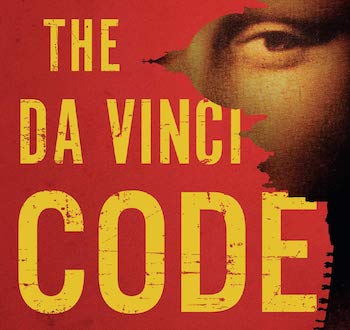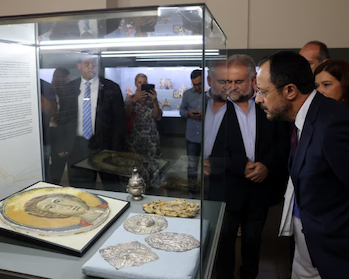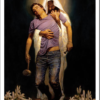Every one still talks about it, Tom Hanks starred in its movie version and many are still criticising it.
Thriller-buffs beg, borrow or steal The Da Vinci Code – ‘a brew of conspiracy theory, romance novel and pseudo-scholarship’, which has been in the news ever since it was published in 2003. Author Dan Brown combines history with glamour, to encourage the gullible to identify with his intelligent characters, who are in search of ‘truth’.
People say that Christians criticise anything – even things that we know nothing about. So I decided to read The Da Vinci Code, so that I would be deemed fit to criticise. If you see that line where fiction ends and fact begins in this book, please holler, I’d love to hear from you.
Brown does not admit that his offensive work is pure fiction. He claims at the opening of the book that, “All descriptions of artwork, architecture, documents and secret rituals in this novel are accurate.” Hence, some view The Da Vinci Code as a genuine exposé of Christianity. They forget that Brown has distorted and fabricated – history. Scholars say that much of what he wrote is factually inaccurate and plagiarised from earlier pseudo-historical works against Christianity – such as an earlier book by conspiracy theorists Lynn Picknett and Clive Prince, entitled The Templar Revelation: Secret Guardians of the True Identity of Christ (1997)
Dan Brown’s The Da Vinci Code begins with the murder of Jacques Saunière, the curator of the Louvre Museum. He is shot by Silas, an albino monk. Silas’s gun is a 13 shot model, but he only fires one shot before Brown declares that the gun is empty. He had killed two other men the same night; one critic wondered if it took 12 shots to kill them. The gunshot injury of that sort has a mortality rate of less than 5 percent and would take hours to kill someone – but Brown declares that he has only minutes to die. And Saunière cannot escape because a drop-down gate is blocking him. Louvre has no such gate, but never mind.
The dying Saunière wants to give a message to his granddaughter Sophie Neveu. You’d think it is a mere ‘I love you, please be a good girl’ message, but no. Instead, the thoughtful grandfather utilises his last moments to pose himself naked, like Da Vinci’s famous drawing – Vitruvian Man, writes cryptic messages all around the Louvre walls and draws a Pentacle on his stomach with his own blood – all for cryptographer Sophie to decode. Hmmm…It is a good thing that he dies; else the Louvre authorities would kill him for desecrating their walls thus. Harvard symbologist Robert Langdon is soon summoned to the spot to help investigate the murder. A symbologist? Intriguing! Harvard? Wow! But Harvard has no department of symbology – it is a pseudo-academic discipline concocted by Brown.
Neveu teams up with Langdon to crack these codes. Neveu and Langdon discover that some clues are hidden in Da Vinci’s famous paintings. They finish off where Saunière started and wrench paintings off the Louvre walls. Brown gets the size of Madonna of the Rocks wrong; it is 6’ 6”, not 5’ and really heavy, but Sophie lifts it anyway. Brown reports that the Pyramid of the Louvre is composed of 666 panes of glass. Not according to the architect who designed it. The Louvre has real security cameras, but to keep his characters busily involved in murder, doing gymnastics on the floor before dying, tearing up paintings etc, Brown declares that most of the cameras in Louvre are fake. Are any thieves reading this?
Neveu and Langdon begin mystery-solving in a Smart Car which can actually get 17-24 to the litre, but since they are in a hurry, Brown lets the car race – 100 miles per litre. The GPS unit placed on Langdon by the French Police would have to be ten times larger to work the way that Brown describes. Neveu and Langdon find that Da Vinci, Newton, Hugo and Botticelli had belonged to a secret society called the Priory of Sion. Saunière was one of its last surviving agents. More intrigue – but The Priory of Sion became widely-known only in 1962 as started by a convicted right wing embezzler named Pierre Plantard. There are no papers supporting the Priory’s existence in the Bibliotheque Nationaleas Brown insists, though some forged documents were placed in the archives by Plantard.
Blasphemy comes in next – Brown says that the Church has been suppressing the ‘truth’ about Jesus Christ. Silas, a monk from the catholic organisation Opus Dei, kills those who know this secret. Silas practises corporal mortification, which according to Brown, is not abstaining from worldly pleasures, but scourging himself and wearing a cilice belt. Eeeeeww.
Langdon and Neveu break cryptic codes with the assistance of Leigh Teabing (Wolf in sheep’s clothing kinda man) to declare that Christ was merely human and the Holy Grail is not the chalice used at the Last Supper, but Mary Magdalene from the tribe of Benjamin, who was pregnant with the child of Christ! God forgive me for repeating this blasphemy. Note that Sir Leigh’s name is an anagram of the surnames of Michael Baigent and Richard Leigh — authors of Holy Blood, Holy Grail – a heretical book dabbling in Gnosticism.
Brown says that a pregnant Magdalene was sheltered by the Jews of Marseilles and gave birth to a daughter, Sarah. This bloodline became the Merovingian dynasty of France. This secret was known to the Priory and guarded by the Knights Templar. Sophie Neveu and her brother, whose last names were changed to Neveu, (nephew) are descendants of this bloodline. Fictional character Sophie Neveu thus bags an ancestry, courtesy of Brown.
According to Brown, the Church hid the truth about Jesus’ bloodline for 2000 years by referring to his wife as a prostitute; and Catholics consider the sacred feminine, satanic. But, our Protestant friends criticise the Catholic Church for the honour given to Mother Mary and numerous other women saints. Brown’s church executed millions of female witches in Europe, but history says the actual number was between 30,000 and 60,000. The more the merrier, Brown? Contrary to Brown, not all witches were women, not all were burned and not all were executed by the Church. Constantine did not make Christianity the official religion of the Roman Empire in A.D. 325. It happened under Theodosius 50 years later. How could the Knights Templar, a medieval military order, construct Gothic cathedrals as Brown claims, is beyond my comprehension. Brown reports that the ancient Olympics were held to honour Aphrodite. I learned in school that the Olympics were held to honour Zeus.
Brown says that the Mona Lisa is a self-portrait by Leonardo. But Leonardo’s assistant Caprotti’s notes say that Mona Lisa was the wife of a local merchant. Brown alleged that Mona Lisa is actually an anagram for “Amon L’Isa” – the father and mother gods of Ancient Egypt, Amon and Isis. However, in Egyptian Mythology, Isis was not the spouse of Amon, but of Osiris and Amon’s spouse was Mut. The Mona Lisa was not called by that name during Leonardo’s lifetime anyway. Brown’s “Amon L’Isa” anagram is therefore a fraud. He says that the Grail relics include the actual bones of Magdalene. But as one critic said, Magdalene’s bones were not buried within the Glass Pyramid at the Louvre, but good taste was.
Historical evidence shows that the New Testament and the oldest Christian writings highlight the root of the Christian belief – that Jesus was God. Brown says that before AD 325, Christ was considered a “mortal prophet” by his followers. But the gospels written by them do not support this weird theory.
Now please don’t get me started on the ‘Bible was falsified’ bit. The theory of Christ’s marriage has been debunked by scholars, with extensive reference spanning centuries. Paul would not have advocated celibacy if his Lord was not celibate.
Brown believes that Da Vinci was a member of the Priory of Sion and revealed the top secret through The Last Supper. Brown points out that the figure seated next to Christ is not John, but his wife Mary Magdalene, as this figure is feminine in appearance. Christ and this person are dressed inversely (blue and red) and their figures also form the letter M, which according to Brown, symbolises a sacred union. Art historians and Leonardo scholars dismissed this crazy interpretation on the ABC News in 2003 and added that it’s traditional to paint John as beardless and long-haired. Brown ridiculously expects the youngest disciple to spout a flowing beard. If that figure is Magdalene, then where is John? The faces of Jesus and Philip in the same picture are delicate too. Many of the men in Leonardo’s paintings and drawings are effeminate such as St. John the Baptist in the Louvre. Brown then confuses between John the Baptist and Jesus in another painting. He adds that nuns had commissioned Leonardo to do the paintings – wrong; it was a confraternity, which were only males. Nobody complained to Leonardo about symbology in the paintings, they only worried over the time constraint.
Opus Dei slams the book’s slander of the institution. Its members do not take vows, bail out the Vatican bank, wear robes, sleep on straw mats, commit murder for the church or practise bloody corporal mortification. I happily noted on their web site that women Opus Dei members do not have a separate entrance and clean the men’s residence halls for no pay, like the books states. Contrary to Brown, Architectural Digest has never said a word about Opus Dei’s HQ building. The Da Vinci Code suggests that the Church put Opus Dei’s founder on the “fast track” to being named a saint. But the canonization of Escrivá came 27 years after his death – not 20, as the book says. Mother Theresa was beatified just 6 years after her death. Escrivá was beatified only in 17 years, so Brown should give Opus Dei a break.
Brown just makes up stuff as he goes along. I am not good at Mathematics, but I agree with critics who say that the “Divine Proportion” applied to bees is stupid. Hives and seasons change, Brown. Paris was not the site of the world’s first prime meridian. There is no 10th knight “missing” in the Temple Church in England – there are only nine. Kings College then had only desktop Macs, which could not do the sophisticated search that Brown describes. The Pope did not preside over Newton’s funeral but wrote an epitaph four years later. Brown calls Leonardo a “flamboyant homosexual”. Leonardo must be turning in his grave because scholars believe that he was celibate except for a hastily dropped charge of sodomy. He was not into darker arts but strictly against the occult. Leonardo did not make torture devices, but designed some weapons of war. Brown then says that this maker of torture weapons worshipped the peaceful Mother Nature. None of Leonardo’s nature sketches had religious elements.
Brown taught English (not religion) in a school upto 1996. Eminent scholars laugh at Brown because he thanks art museums, societies and libraries to give the impression that he has done thorough research. Brown obviously padded the acknowledgement list to make it sound more impressive. As one critic points out, Project Gutenberg is an online library, so Brown’s “acknowledgement” means that he looked at one of its websites. Editor of Catholic World News, Phil Lawler, openly declared that Brown had never contacted the CWN as he claimed.
Additional information
On March 15, 2005, Tarcisio Cardinal Bertone broke the church’s silence on the controversial book. He referred to it as a “gross and absurd” distortion of history, full of “cheap lies”. At a speech in Kansas on October 7, 2005, Salman Rushdie said, “Do not start me on The Da Vinci Code…a novel so bad that it gives bad novels a bad name.” He added, “Even Dan Brown must live. Preferably not write, but live.” Sony’s Columbia Pictures released the movie version in May, 2006. Producers were barred from filming at the Westminster Abbey but the Dean of Lincoln Cathedral permitted shooting at the cathedral. The film company had reportedly offered a donation of £100,000 (BBC News) An elderly Catholic nun, Sister Mary Michael, knelt in prayer outside the cathedral for 12 hours to object to the filming.
Other books by Brown
Digital Fortress got criticised for referring to Spain as a country where hospitals smell of urine, and cops borrow bribes; a place from where “making an international call depends on how lucky you are”. Brown describes a character’s injury – “such a lung injury could be easily treated in any medically advanced nation, but this was Spain.” Apparently, the mayor of Seville invited Brown to visit the city to find out what it is actually like. I would advise Brown to stay at home. He might be safer there.
Angels and Demons was criticised for factual inaccuracies. Brown suggests that many tenets of Christianity are derived from other religions – the practice of ‘God‑eating’ or the Holy Communion – was borrowed from the Aztecs and the concept of Christ dying for our sins is not Christian, but comes from the Quetzalcoatl tradition – the self‑sacrifice of a young man to absolve sins. Again Brown conveniently forgets that the Aztecs and Christianity came into contact only after the 16th century long after Christianity had fully developed on its own.
Theodore Roosevelt once said that a book is only successful if it offends every reader at least once. Maybe it was not he who said that, but maybe I should attribute that quote to him for credibility, like Brown does? Anyway, the person who said that had a point. By that measuring stick, The Da Vinci Code is an unqualified triumph.
The book insults not just the Catholic Church, but Christianity as a whole. Everyone may be entitled to his own opinion but everyone is not entitled to his own truth. Truth is but one. So don’t believe all that you read. I do not.
I believe what A. W. Tozer wisely said – the unbelieving mind would not be convinced by any proof and the worshiping heart needs none.
By Linda Joseph Kavalackal
Christ & Co.













